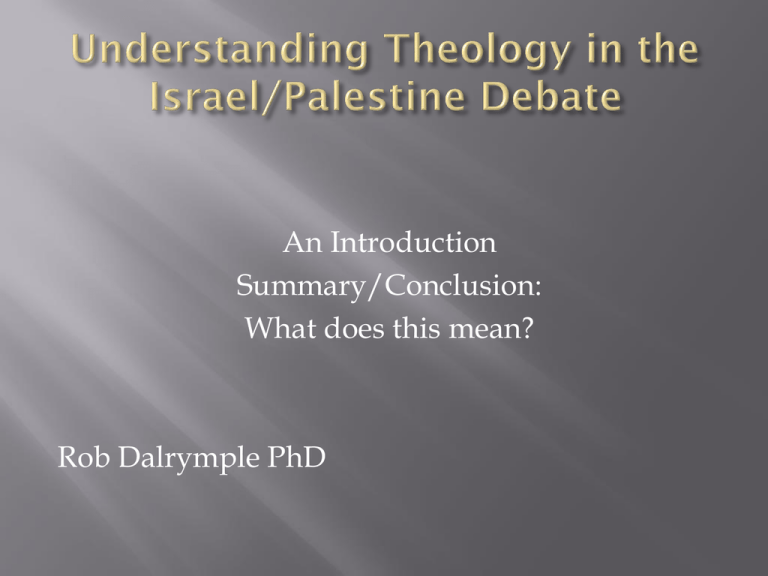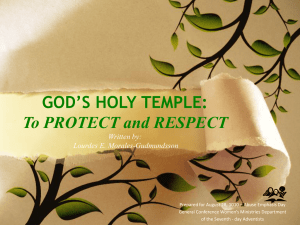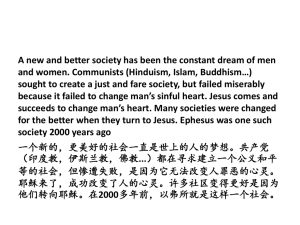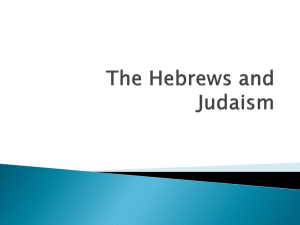Understanding Theology in the Israel/Palestine
advertisement

An Introduction Summary/Conclusion: What does this mean? Rob Dalrymple PhD Goal was for God to dwell: Among all His people Throughout His entire creation Temple: Two-fold goal (all persons, all places) is lost with sin: man is expelled from the Garden We have seen that God permitted temporary structures (tabernacle and temple) Jesus, as God among us, is the fulfillment of the promise of a temple Through the Spirit, the people of God are now the Temple of God The NJ provides the consummation: Garden restored People of God God intended to dwell among all mankind Abraham: means by which God redeems the nations One race cannot have been the fulfillment of God’s promises The people of God were to be a light to the nations Jesus, as the ‘light of the world’ is the fulfillment of the promises of the people of God Through the Spirit, the NT people of God are the ‘light of the world’ The New Jerusalem consummation Land God intends to dwell throughout His creation God calls Abraham and gives him the land so that through it He might bless the entire earth One land cannot be the fulfillment of God’s purposes The land was to expand as the nations came to Jerusalem Jesus, as the ‘vine’ is the fulfillment of the promise of land NT people of God go to the ends of the earth New Jerusalem fills the earth Note pattern: Eden: God’s presence among all mankind throughout the earth—expulsion Temporary provision--explusion (Tabernacle/Temple) (Abraham) (Land) Jesus fulfillment (temple) (people of God) (Land/earth) NT people of God through the Spirit fulfillment (temple) (people of God) (Land/earth) New Jerusalem consummation (temple) (people of God) (Land/earth) This is the significance of the Great Commission: Go to the ends of the Earth (land) Make Disciples of all nations (people) I am with you always (temple) Land and Family In the NT we see Jesus telling them to sell their land and He redefines family as those who do the will of His father! Land and Family Fulfills Isaiah:The land and family criterion disappears Isa 56:3-7: “Let not the foreigner who has joined himself to the LORD say, "The LORD will surely separate me from His people." Nor let the eunuch say, "Behold, I am a dry tree." 4 For thus says the LORD, "To the eunuchs who keep My sabbaths, And choose what pleases Me, And hold fast My covenant, 5 To them I will give in My house and within My walls a memorial, And a name better than that of sons and daughters; I will give them an everlasting name which will not be cut off. 6 "Also the foreigners who join themselves to the LORD, To minister to Him, and to love the name of the LORD, To be His servants, every one who keeps from profaning the sabbath And holds fast My covenant; 7 Even those I will bring to My holy mountain And make them joyful in My house of prayer. Their burnt offerings and their sacrifices will be acceptable on My altar; For My house will be called a house of prayer for all the peoples.” Isa 56:3-7 foreigner—who has no land eunuch—who could have no children Both promised a stake in the new covenant NOTE: JESUS CITES ISA 56:7 WHEN HE CLEANSES THE TEMPLE! Isn’t this interpretation allegorizing the Bible? No. We have contended that the purpose of the Temple, people, and land have found their true intended fulfillment in the NT To say Jesus is the Temple of God is not to allegorize or spiritualize the Bible: Jesus is the physical and spiritual fulfillment of the Temple; the New Jerusalem is both physical and spiritual Have we not ‘spiritualized’ the Bible? No, we have simply interpreted the Bible in light of its intent; following the purpose and mission of the Temple, people, and land has led us to the understanding that it was intended all along to find its fulfillment in Jesus Aren’t the promises ‘forever’?; Yes, in Christ Yes, in the New Jerusalem What about the promise that God will restored Israel? 1. Repentance must precede restoration (Deut 30:1-6; Dan 9) Deut 30:1-3 “So it shall be when all of these things have come upon you, the blessing and the curse which I have set before you, and you call them to mind in all nations where the LORD your God has banished you, and you return to the LORD your God and obey Him with all your heart and soul according to all that I command you today, you and your sons, then the LORD your God will restore you from captivity, and have compassion on you, and will gather you again from all the peoples where the LORD your God has scattered you.” 2. NT Understands the restoration of Israel was through Jesus JTB preached baptism of repentance: ‘For the Kingdom of God is at hand’ (Mark 1:1-4, 15; Matt 3:1-3; Luke 3:3-8) Jesus came for the ‘Restoration of Israel’ (Luke 2:25, 38; 24:21-28) Triumphal entry was fulfilling the restorationist hope of Zech 9:9 Commissioning his disciples to be ‘Witnesses’ (Acts 1:1-8); fulfills the role for Israel in Isa 43:10 What about the promise of the regathering of Israel (Rom 9-11) 1. We can differ here and it should not effect our conclusions of the contemporary conflict in Israel/Palestine 2. If Jesus inaugurated the restoration of Israel in His ministry then we might conclude that this has been happening for the last 2,000 years 3. To say that a future restoration of ethnic Israel must happen in fulfillment of the prophecies of Scripture doesn’t recognize that the purpose of Israel/people of God as the light of the nations finds its fulfillment in Jesus, the NT people of God, and the New Jerusalem Isn’t the promise of land an everlasting possession? Land promises are fulfilled in Jesus: Jesus tells the rich youngman to sell his land (Matt 19:22) NT people of God sell their land Neither Jesus nor the apostles ever taught that ethnic Israel will return to the land Isn’t the promise of land an everlasting possession? Even if we differ here we must note that neither Abraham nor David displaced people Abraham never owned land—he bought the burial site for Sarah David bought the threshing floor; they did not steal it even though God had ‘given’ it to them Ahaz stole land from Naboth (1 Kings 21): he ‘did evil in the sight of the Lord’ (1 Kings 21:20) Isn’t the promise of land an everlasting possession? Promises assumes covenant faithfulness Lev and Deut make this clear (Deut 4:25-27; 28:1568; Lev 18:24-30; 20:22-26) Promises assume covenant faithfulness: Deut 4:25-27: ‘ When you become the father of children and children's children and have remained long in the land, and act corruptly, and make an idol in the form of anything, and do that which is evil in the sight of the LORD your God so as to provoke Him to anger, I call heaven and earth to witness against you today, that you will surely perish quickly from the land where you are going over the Jordan to possess it. You shall not 1live long on it, but will be utterly destroyed. The LORD will scatter you among the peoples, and you will be left few in number among the nations where the LORD drives you’ Promises assume covenant faithfulness: Lev 18:5, 24-30, 26, 28 ‘so that the land may not spew you out’ (again in 20:22) Isn’t this replacement theology? No. Jesus is the fulfillment of God’s promises and call to Israel; not the replacement Isn’t this anti-semitism? No. We love the Jews, Muslims, and all others just as Christ love us: We want peace for them and that they know Him who is the prince of peace If we love the Church we must act If we love Israel we must act If we love everyone we must act ‘They will know we are Christians by our love’









